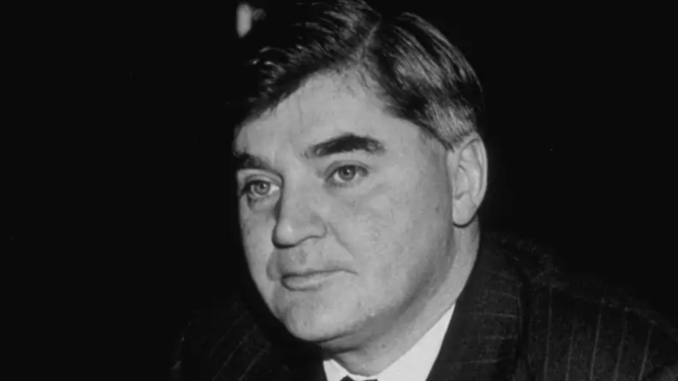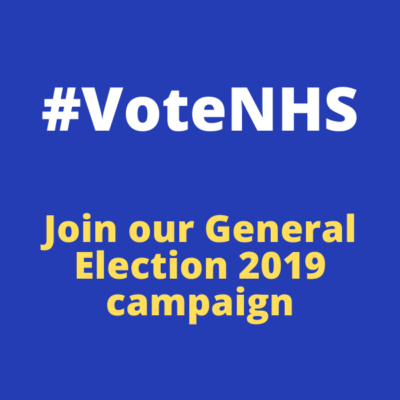
In response to a general election and in real post-truth fashion, the Conservative party has been anxious to rebrand itself across as many media platforms as possible as “the party of the NHS”. Health Secretary Matt Hancock has even said: “It was a Conservative health minister, Henry Willink – under Winston Churchill – who first proposed the NHS 75 years ago”. Now Boris Johnson and a host of other front bench MPs are starting to wax lyrical about how (after nearly a decade at the hands of their abuse) they are the only party who can protect it.
We are glad you are enjoying some of our older articles. If you want to help Keep Our NHS Public out today, then please sign our #6demands for Covid19 petition at Change.org/NHS4All.
One of the things this Government conveniently does not explain in their rewriting of history is that their party fought and voted consistently against Labour Health Secretary Aneurin Bevan’s NHS Bill, one of their main charges against Bevan being that he had completely abandoned their Willink plan (as it was unworkable). A detailed summary of historical events that led to the creation of the NHS is provided in Bevan’s 1975 biography by Michael Foot (Aneurin Bevan 1945-1960) drawn upon below.
Early Plans
The Second World War brought into sharp focus the inadequacies of health care in the UK. After the British Medical Association (BMA) had invited all leading medical organisations to join together and produce a plan for the future, nearly everyone accepted that a complete reorganisation of services was required. In 1942 the Beveridge Report (put forward by Liberal MP William Beveridge) was released. It recommended amongst other things, ‘a national service for the prevention and cure of disease and disability’. The Report was approved by the House of Commons, and when in 1943 Mr Henry Willink, a Tory MP, became minister of health, he continued the work needed to give administrative form to the proposals.
In February 1944 Willink produced his White Paper entitled A National Health Service. However, it was a given that no patient or doctor would be forced to join the new service, and it was assumed that private practice would continue on a substantial scale. The many voluntary hospitals were to be left to decide themselves whether they wished to come on board. It was therefore only a pale shadow of the NHS that was later introduced.
The Willink White Paper was widely supported in Parliament, but the Conservative’s were hopeful that little if anything would be done very quickly. The BMA opposed the White Paper, and following further discussions where they were assured that nothing would be forced upon them, Willink was accused by others of betraying the principles of the White Paper behind the back of Parliament.
A new direction
In July 1945 Aneurin Bevan was appointed the new Minister of Health. In his meetings with the BMA, he concluded that the secret discussions between Willink and the doctors were unacceptable and that the White Paper was in certain vital respects unworkable. Bevan sought to give reassurance to a hostile medical profession:
“They need have no fear...I conceive it the function of the Ministry of Health to provide the medical profession with the best and most modern apparatus of medicine and to enable them freely to use it, in accordance with their training, for the benefit of the people of the country”.
During his first few months in office, he made most of the critical decisions determining the shape of Britain’s National Health Service such that by November 1945 Bevan was accused by his detractors of seriously departing from the Willink plan. Many years later the claim was made that his NHS Bill was an all-party measure. In reality, Bevan transformed the scheme and his changes became the focal point of conflict in the ensuing two years.
Conservative opposition to a socialist product
The socialist purpose of the National Health Service Bill was plainly stated in its first clause: the duty of the Minister of Health to provide a comprehensive health service to improve the physical and mental health of the people, and services to be provided free of charge. (This responsibility has since been removed by the 2012 Health and Social Care Act brought in by the Conservative-led coalition government.)
Willink had always veered away from giving the Ministry of Health the power to build the service, whereas Bevan insisted the Minister must have the necessary authority to perform the duty of establishing a new NHS.
Bevan successfully advocated for the nationalisation of hospitals (including the complete transfer of voluntary hospital to state ownership) which Willink claimed “will destroy so much in this country that we value”. Bevan’s ideas for enlisting the support of general practitioners and how they would be involved in the service were described by Willink as ‘disastrous’. Bevan rightly cast aside the previously prepared Willink White Paper in favour of his own much broader vision.
A comprehensive service
Bevan included dental, ophthalmic and hearing services within the NHS from day one, and for the first time integrated mental and physical health services. Bevan’s Bill imposed a duty on local authorities to provide health centres, care for pregnant mothers, health visitors, home nursing and an ambulance service. He insisted on the service being funded out of general taxation and not insurance, while the Willink funding formula was never spelled out. An outline of his proposals for a National Health Service was presented to the BMA in January 1946.
A three-day debate on the second reading of the Bill was held in Parliament from 30th April 1946. The Tories objected to the Bill on the grounds that it would lead to a possible future full-time salaried service for doctors, and was a threat to the patient-doctor relationship. They claimed it undermined local government, and wrecked the voluntary hospital system. Above all, they raged – ‘Bevan had abandoned many of the precepts of the Willink White Paper’!
The second reading was carried by 359 votes to 172, the Tories voting against. During the Committee stage there were major arguments with Willink and the Tory lawyers who were helping him. Bevan happily accepted the Tory accusation that he had completely overthrown the Willink plan, which he described as:
“a hopelessly impractical compromise based not upon functional considerations but merely upon a desire to conciliate conflicting interests”.
When lawyers for the Conservative party brought up legal complexities about transfer of endowments from the voluntary hospitals, he brushed these aside by pointing out that the patients mattered more than the donors. At the third reading of the Bill, the Tory Opposition amendments to reject it were even more fierce, with Churchill and colleagues inciting the medical profession as much as possible into opposition. In July 1946 the Tories again voted against the Bill, but the third reading was carried by 261 votes to 113.
We live in an era of fake news, but facts are stubborn things. One thing that’s clear from the bombardment of insincere statements designed to win votes, is that claims made by the Conservatives to be the party of the NHS must be rejected as a falsification of history.
Dr John Puntis is Co-Chair of Keep Our NHS Public







Thank you for your efforts to bring about social-justice, and to clarify the untruths, currently being promoted by this charlatan government, being led by a charlatan to whom the truth is a stranger. Please keep up the good work.
Very clear and as I understood the history. As a child of the 50’s I have much to thank our NHS for. Manipulation of historical facts and truth must be opposed corrected and challenged with facts and historical records. Thank you for standing up for truth and accurate facts.
So sick of Tory lies. Blatantly untrue, Boris still wants to give our nhs to Trump. I bet they both still remaun in power. Why do we allow this to happen, very sad & angry …..
The Beveridge (Liberal) Report and the Wallink (Tory) White Paper were both foundational pieces of the NHS, that can’t be wished away. There was Tory opposition to the Bevan form of the NHS, not a comprehensive National Health system per se. They were in line with the medical ‘experts’ – the BMA, who were overwhelmingly opposed to the Bevan version of the NHS.
Indeed, Bevan had to bow to the BMA demands for operational independence through the use of Doctor contracts, effectively treating the Doctor’s domain as a private operation, this as a way of mitigating the opposition of doctors to becoming simple employees of the British state.
Also widespread opposed, by responsible and discerning people, was the forced nationalisation of local health jurisdictions replaced by an enormous monolith. There was a great deal of opposition to Bevan’s implementation from across the political spectrum – not a widespread opposition to a system of no-charge for health services to those in need.
Painting the NHS as a purely Labour development is highly disingenuous and gratuitously divisive and immature. What is the point? Oh yes, propaganda.
You are obviously aTory,the NHS WAS excepted by the BMA,your MP was wanting a continuation of only the rich health service.But the LAB/LIB NHS service,was as it is today for EVERYBODY.
And you are definitely a labour leftie, who hates facts, all parties had a hand in the nhs, the main opposition was the doctors of the baa, who could see their monopoly of costs disappearing
Thank you. 100% correct. Why can’t people research? We all have computers, and it’s so easy. So depressing when people just blindly follow what someone else has said.
Some what rather selective article conveniently missing out the 1944 Beverage report and the fact a proposal by a Conservative MP in 1943 got cross party support
It is important to note that Beveridge wrote his report on the future Welfare State before he joined the Liberal Party and before he was elected as a Liberal MP. He was commissioned to write the report by Labour’s Deputy Leader and then Minister without Portfolio in the war time coalition Arthur Greenwood. Beveridge was chosen by Greenwood on the recommendation of Trade Union Leader and later Labour Foreign Secretary Ernest Bevin. To suggest that somehow the NHS is a Liberal creation is false and based on a misunderstanding of history
Quite right, but the much glorified Mr Bevin didn’t “do the work”, he only “rubber stamped” the proposal once the Labour Party were in Government. Beveridge and Willink are really the creators of the system.